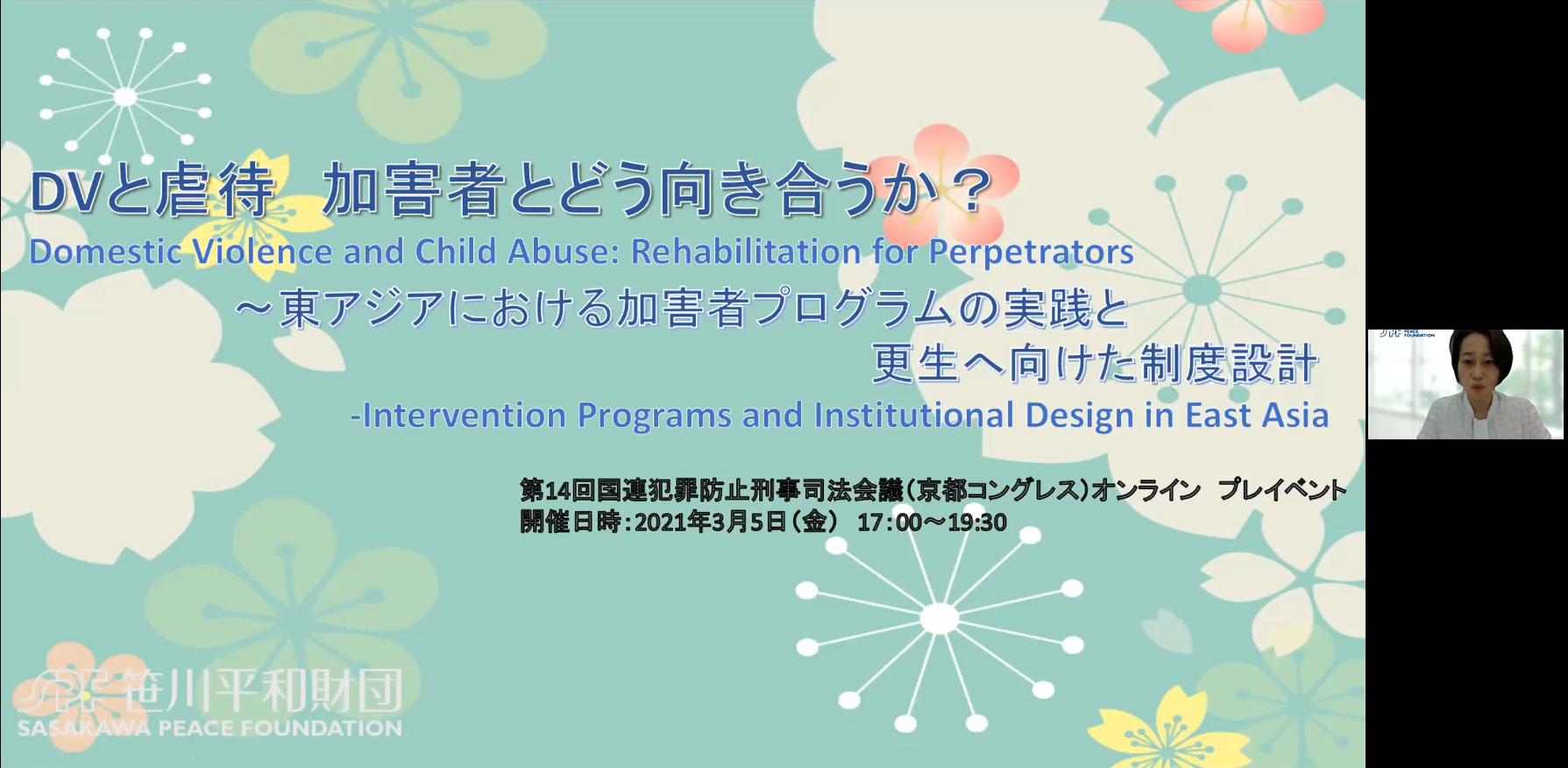The second session, entitled "Issues on Designing the System in Japan" and covering the theme of “Offender Rehabilitation Programs on the Ground,” representatives from three non-profit organizations that are implementing programs based on North American models explained the current situation in Japan and raised issues that need to be addressed.
Adopting a program she studied in Los Angeles, Ms. Noriko Yamaguchi of “AWARE,” a program that has been run in Tokyo since 2002 with 400 male perpetrators (at the time of this event), argued that perpetrators are "normal people with high education and social status" and "not sick, but have a pattern of distorted thinking and behavior.” The program requires participants to attend at least 52 meetings and to discuss their experiences in groups, reflect on themselves objectively, and change their values, attitude, and behavior by becoming aware of the other person's position. Ms. Yamaguchi also mentioned that psychological violence is on the rise, and said that violence against women "stems from social structures that discriminate against women and assign roles based on gender.”
On the other hand, Ms. Eko Koga of the Respectful Relationships Program (RRP) Research Group, which has been implementing a program to rehabilitate perpetrators since 2005, said that it is important for people to recognize that “violence is not a disease but a responsibility, and that being a good husband means being a good father.” In the RRP Research Group’s program, perpetrators participate in groups of 8 to 10 people, meeting once a week for 2 hours for a total of 18 sessions. Ms. Koga mentioned that the number of participants is small so it is "frustrating that we are only dealing with the tip of the iceberg," and also pointed to difficulties in securing space, labor costs, and personnel.
Mr. Tadashi Nakamura, director of the Center for Liberal Arts Education at Ritsumeikan University and chair of the Cabinet Office's Research Group on Actions to DV Perpetrators, discussed the current situation where child abuse and domestic violence overlap, mentioning recent cases of child abuse deaths as examples. Mr. Nakamura started the "Men's Parent School" in Osaka 15 years ago, which aims to help people break free from violence committed by men. Men meet in groups twice a month for two hours at a time to discuss child rearing and strategies for rebuilding marital relationships. Since "child-rearing support alone puts a burden on mothers and wives," Mr. Nakamura presented a perspective that incorporates both "vertical child-rearing support and horizontal DV education for prevention.” Mr. Nakamura also suggested structuring the program to include DV prevention education in parental guidance orders, since the family court can be involved in child abuse cases.
Ms. Chisato Kitanaka, associate professor at the Harassment Consultation Office in Hiroshima University and joint representative of the All Japan Women's Shelter Network, discussed the Japanese law on DV (Prevention of Spouse Violence and Protection of Victims), and pointed out that protection orders issued by courts are only applied to physical violence and do not apply to non-married couples. She also pointed out many issues that need to be addressed, including the fact that (1) public counseling centers do not specify the services they can offer, (2) there is no comprehensive support for those who want to get divorced or to work, (3) the non-profit sector is small and volunteer-based, (4) there is no place for young women to go who have been abused by their parents or siblings, and (5) the concept of social work is not well established. Stating that the "support for victims is too weak,” she proposed the establishment of public-private partnerships to provide comprehensive support.
Ms. Akiko Kikuchi, chief of the Education Development Unit at the National Center for Cognitive Behavior Therapy and Research, spoke about the need for a commonly available risk assessment. When contending with DV is considered as "public health prevention," she explained that "primary prevention is psychological education and awareness-raising education to prevent cases; secondary prevention is early detection, intervention, and implementing perpetrator rehabilitation programs to prevent conditions from deteriorating; and tertiary prevention is court-ordered mandatory perpetrator rehabilitation programs.” Furthermore, she suggested the use of risk assessment and training programs.
In response to the previous presentations, Dr. Yanshu Li, a visiting researcher at the Hokkaido University Center for Ainu and Indigenous Studies, said, "Although there is a difference between the two countries in that South Korea's approach emphasizes more on criminal punishment while Taiwan's approach focuses more on the side of civil law, the two countries have in common a unique East Asian culture in which the law does not enter the home and the family is viewed as a unitary entity, which means that the punishment for the perpetrators is minor." As for Japan, he said, "we have to do our best" in comparison with South Korea and Taiwan, where investments have been made in legal funds and institutional progress has been made.
Lastly, Mr. Hiroki Hayabuchi, counselor at the Ministry of Justice, spoke about the need for the private sector, local communities, and the government to deepen their cooperation. He also noted that on the civil side, concrete efforts are being made to ensure safe and secure visitation, adding that the interests of the child should be the top priority, rather than the conditions pertaining to visitation and child support after divorce.
(The original Japanese article was published on March 17, 2021.)
